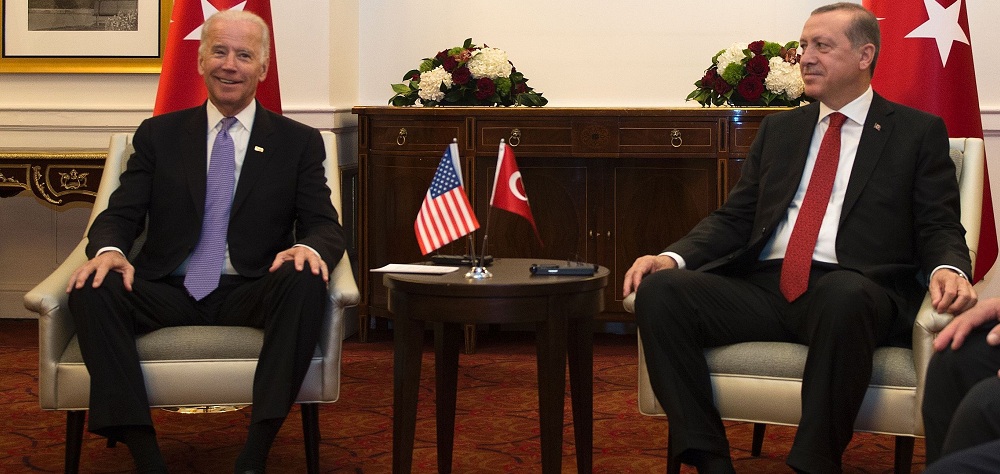Alwaght- As the Democratic candidate Joe Biden announced his victory in the US elections last week, thousands of kilometers away the Turkish national currency lira witnessed a considerable value loss, to an extent that President Recep Tayyip Erdogan in a snap order dismissed the central bank governor.
The lira price slump against the US dollar while Joe Biden was declared president-elect of the US is not irrelevant to the future Washington-Ankara relations under Biden. The fact is that Erdogan was very much expecting Donald Trump to win the second term and thus remain at the White House but the page turned to the surprise of many. Many experts predict that Turkey will have many problems and challenges with the Biden White House, and the veracity of this prediction showed itself in the shrinking of the lira.
Under Trump that the US-NATO relations observed their lowest and coldest levels, Turkey was not afraid to pick challenges with the fellow NATO members in the Mediterranean Sea. Albeit, indifference to the Turkish actions by the Americans was not only in the Mediterranean. During the Trump presidency, Ankara took adventures in many regional parts with an open hand with the Americans showing not much sensitivity.
From the Mediterranean to Syria will be areas of challenges for the Turks
The energy exploration in the Mediterranean waters and also Cyprus dispute are the major challenges of Turkey with Greece and other European countries especially France. In 2018, the EU and mainly France asked Turkey to stop its drilling for oil and gas in the sea areas disputed with Greece. But the tensions with Paris in Libya escalated the tensions between the two countries, reaching verbal threats and even insult exchange between the presidents of the two countries.
The tensions run so high that even France called on NATO to expel Turkey from the Western military organization and currently Paris is pursuing in the European Council a bill of anti-Turkish sanctions. Despite all these tensions, the US stood as an observer, and the Trump administration as an ally of the EU and France hardly criticized Turkey. This long silence and occasional and smooth criticism of Ankara by Trump is what Erdogan wants. But it is unlikely that the US remains purely an observer in the Turkish-European tensions under Biden.
The US ignorance of the Turkish actions against Greece and the European countries was largely because of Europe’s unimportance for Trump. For the Trump administration, even NATO was not of priority and the president more than once complained about the unfair share of the European states in the military bloc’s budget and naturally this made the US government reluctant to enter the European-Turkish strain and perhaps it intentionally opened Turkey’s hand behind the scenes to take on the Europeans in the Mediterranean.
But the vision and conditions of Biden whose inauguration is on January 20 are different from those of Trump. In fact, Biden hardly turns a blind eye to the Turkish exploration in the Mediterranean and the dispute with Greece.
While Trump in office, Turkey even ramped up its actions in Syria, but Biden is not anticipated to remain silent about what Erdogan does in war-weary country. If the exit from Syria was the top slogan for the Trump administration, for Biden remaining in Syria under the ruse of determining the situation in the Arab country would be of emphasis. Chances are the Turkish forces positioned in the Kurdish-majority areas of Syria will face restrictions by the US forces under Biden.
So, there is no doubt that with Biden coming to rule, the golden period of the US indifference to the Turkish regional actions will end and the period of big US challenges with Turkey in the Mediterranean and Syria will arrive.
Turkey’s home issues find a place in future ties with the US
As much as the foreign policy area will be challenging for Turkey under Biden, home issues can add to Erdogan's troubles with the incoming US government.
The human rights and the Kurds make two sensitive cases for the Democrat administration and the White House officials may take serious interventionist actions in addressing them.
Erdogan government over the past four years showed an iron fist to the Gulenist Movement, named after the US-based Turkish preacher Fethullah Gulen who is accused of orchestrating the 2016 failed coup against Erdogan, without concerns about Washington reactions. But under Biden, such massive arrests and crackdowns on the opposition may draw a serious response from the White House.
Furthermore, although the US has the Kurdistan Workers Party (PKK) on its terror blacklist, perhaps continuing the anti-Kurdish war and bombardment of the Kurdish areas of northern Syria will not go without reaction from the Biden administration. Biden administration may want Turkey to show more flexibility in the face of the issues of the Kurdish regions.
Another potential knot between Erdogan and Biden would be the Turkish purchase of the Russian-made S-400 air defenses. Trump may have tried to play opposite to the deal, but was not much serious and that maybe because Trump is labeled a president leaning to Kremlin. Except for some occasional stances in opposition to the S-400 deal with Russia by the US Department of Defense, Trump personally was more for negotiations with Turkey to solve the problem, and instead of pressing Ankara to cancel the purchase, he was in favor of new US arms sales to Turkey. Even the threats made by the Trump administration to drop Turkey from the F-35 fighter jet program are not applied yet. Turkey is a party to a massive supply chain of the parts of the stealth fighter and one of its buyers.
Under Biden, the US may depart from verbal threats concerning the S-400 deal and resort to some actions like implementation on the ground of Trump's threats that remained verbal to date.



























